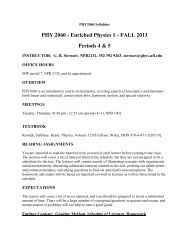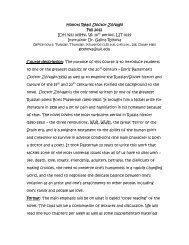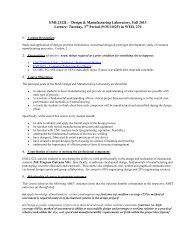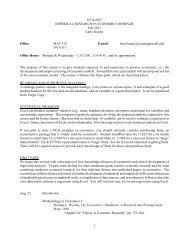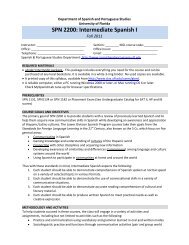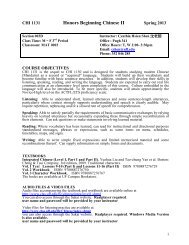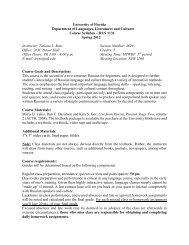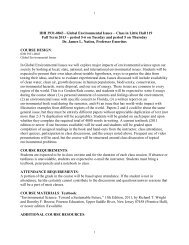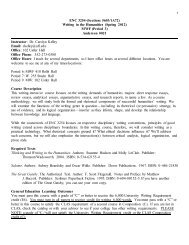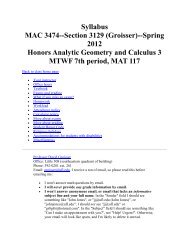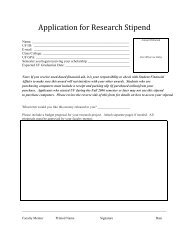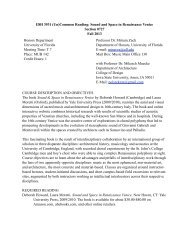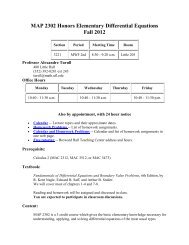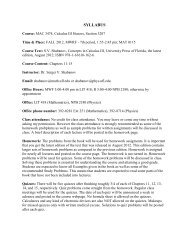PHA 3931 Hnr Magic Bullets McKenzie - University of Florida ...
PHA 3931 Hnr Magic Bullets McKenzie - University of Florida ...
PHA 3931 Hnr Magic Bullets McKenzie - University of Florida ...
- No tags were found...
You also want an ePaper? Increase the reach of your titles
YUMPU automatically turns print PDFs into web optimized ePapers that Google loves.
<strong>PHA</strong> <strong>3931</strong>Honors Seminar inPharmaceutical Research"In Search <strong>of</strong> <strong>Magic</strong> <strong>Bullets</strong>"Course CoordinatorMichael W. <strong>McKenzie</strong>, Ph.D.Senior Associate Dean for Pr<strong>of</strong>essional AffairsPr<strong>of</strong>essor, Department <strong>of</strong> Pharmacy Practice(272-6221; room G-234 Student Services Center, HPNP Complex, Health Science Center)email: <strong>McKenzie</strong>@cop.ufl.eduOffice HoursStudents may meet with the course coordinator on Mondays, Wednesdays, or Fridays after class orfrom 4-5PM or by appointment at other times. An appointment can be arranged by contacting thestaff in the Office for Student Affairs at 352-273-6217.Course Educational PhilosophyThis course does not require a background in the pharmaceutical sciences. The emphasis <strong>of</strong> thecourse is on concepts and processes. The course will not accentuate factual knowledge within thepharmaceutical sciences. This course will focus on the advantages and disadvantages <strong>of</strong> usingmedications to cure or control disease. That is, do “magic bullets” really exist?All students in the honors program, but especially students with a strong interest and/or aptitude inthe sciences, are encouraged to register for this course. The course content is meant to helpstudents with a variety <strong>of</strong> educational majors to understand many issues related to drug research,the drug approval process, the historical perspectives on the development <strong>of</strong> selected drugs, and theadvantages and disadvantages that are associated with selected medications.Students are expected to enhance their learning by attending classes and participating indiscussions. Students are expected to use appropriate English grammar in a term paper and to writeconcisely with details in response to questions on examinations.GoalsThe goals <strong>of</strong> this course include the stimulation <strong>of</strong> intellectual curiosity about issues in the pharmacypr<strong>of</strong>ession and in pharmaceutical research.
ObjectivesStudents taking this course will be expected to:1. Describe the benefits <strong>of</strong> drug research in our society.2. Discuss the concept <strong>of</strong> pharmaceutical care in terms <strong>of</strong> definition andpractical applications by pharmacists.3. Explain the concept <strong>of</strong> "A <strong>Magic</strong> Bullet” in terms <strong>of</strong> definition, possibilities,and limitations.4. State the process by which a drug becomes approved by the FDA.5. Discuss several societal implications <strong>of</strong> drug research (i.e., establishment<strong>of</strong> priorities, cost/benefit, measurement <strong>of</strong> health outcomes, regulatorypractices).6. State the real and potential adverse consequences <strong>of</strong> inappropriate druguse.7. Recognize how several drugs work as "magic bullets" in the body.9. Describe various research projects currently in progress bypharmaceutical and clinical scientists in the College <strong>of</strong> Pharmacy.Course DescriptionThis seminar course will examine selected pharmaceutical research activities by pharmacy faculty,process and issue in the development <strong>of</strong> new drugs, drug tragedies, pharmacists’ role on the healthcare team, and mechanisms <strong>of</strong> action <strong>of</strong> drugs. The course will include commentary on social issuesrelated to pharmaceutical research such as the time, expense, and testing necessary to deliver newdrugs to the public, and the need to properly monitor drug effects in patients once drugs are releasedfor general use. The course will require readings, discussions in class, and reports on assignedtopics. The course will be team taught by pr<strong>of</strong>essors in the departments <strong>of</strong> pharmaceutics,pharmacodynamics, pharmacotherapy and translational research, and pharmaceutical outcomes andpolicyin the College <strong>of</strong> Pharmacy.ScheduleThe schedule for this course is Monday, Wednesday, and Friday (12:50 - 1:40 PM) in the HealthPr<strong>of</strong>essions, Nursing, and Pharmacy Complex (HPNP) at the Health Science Center (Room G-210on Monday and Friday and Room G316 on Wednesday).
GradingLetter grades will be given to students who take this course. Academic performance will beevaluated through attendance records, exams, and a term paper. A list <strong>of</strong> topics for a term paper willbe made available to you within the first several weeks <strong>of</strong> the semester. Terms papers are dueWednesday November 30, 2011.Exams will count 65%, attendance 10%, and the term paper 25% <strong>of</strong> the course grade. The dates forexams are listed on the topic schedule. Make-up exams will be permitted under the followingconditions: the student has a reasonable excuse for missing the exam, preferably discussed at least24 hours in advance <strong>of</strong> the exam with the course coordinator; and, the make-up exam is completedwithin one week <strong>of</strong> the missed exam. An unexcused absence from an exam will result in a zeroscore for that exam. Students should notify the course coordinator at least 24 hours in advance <strong>of</strong>an exam if they know they cannot attend due to a reasonable circumstance. Greater than fourabsences (excused/unexcused) will result in a zero score for attendance in calculating the coursegrade.The grading scale is based on an achievement <strong>of</strong> a percent <strong>of</strong> total points awarded per performancemeasure. These are: A 93 to 100%, A- 90 to
Instructor and Course EvaluationsAll students are expected to submit an instructor and course evaluation per <strong>University</strong> <strong>of</strong> <strong>Florida</strong>procedures.Faculty Evaluations: You will receive an email from the Curricular Affairs Office requesting thatyou complete faculty evaluations. If the course is team-taught, you will receive emails during thesemester to alert you when to evaluate the faculty members. Please complete your facultyevaluations by the specified date and time by logging in with your GatorLink account at the followingsite: https://evaluations.ufl.eduFaculty evaluations are important feedback for your course instructors and the <strong>University</strong> andreceive major consideration in the tenure and promotion process. Your input via evaluations canmake a difference in our College’s teaching activities, so participate, evaluate and our College will bebetter for it.The online faculty evaluation system is completely anonymous. When you submit an evaluation, thesystem marks that you have submitted an evaluation for the section (so you cannot submit multipleevaluations), but from that point on, there is no connection between you and the evaluation data.Faculty evaluations also provide useful information for students. The results <strong>of</strong> your evaluation inputare made available to all students in future semesters at:http://www.aa.ufl.edu/aa/evaluations/search/.Course Evaluations: In the last few weeks <strong>of</strong> the course, you will receive an email with directions forcompleting a course evaluation. Note, course evaluations provide feedback that is different from theFaculty evaluations and both are very important to continuous improvement <strong>of</strong> our program.Course evaluations are used by the College to identify how to improve the how the course isdesigned and delivered. Therefore, our Courses will be better through your completion <strong>of</strong> theseevaluations. You will complete Course Evaluations via a website that is different from FacultyEvaluations. These evaluations are also anonymous.Academic HonestyThe <strong>University</strong> <strong>of</strong> <strong>Florida</strong> Honor Code States:We the members <strong>of</strong> the <strong>University</strong> <strong>of</strong> <strong>Florida</strong> community, pledge to hold our peers andourselves to the highest standards <strong>of</strong> honesty and integrity.Students are expected to complete assignments and take quizzes with integrity. Academicdishonesty will not be tolerated. If a student commits academic dishonesty, the academic penaltywill be a failing grade in the course. The UF policies and procedures on academic dishonesty will befollowed.Students will have the opportunity to sign the following statement on all work attempted forevaluation:
On my honor, I have neither given nor received unauthorized aid on this examination.Expectations <strong>of</strong> StudentsStudents are expected to:• Be diligent and timely in studying the course material.• Be on time for class meetings.• Be prepared for class or group discussions.• Do your own work.• Actively collaborate with peers when assigned to groups.• Inform the course coordinator about an absence from an exam or other assigned classactivity at least 24 hours prior to the event.• Dress appropriately for class.• Turn <strong>of</strong>f cell phones and other electronic communication devices during a lecture ordiscussion.• Be quiet during lectures or peer presentations.• Be focused and avoid distractive behaviors in class.• Appropriately use the computer in class, i.e., do not be looking at unrelated informationon the web site during class.• Participate in class or group discussions.• Raise one’s hand to be recognized before making a comment in class.• Be respectful to the teacher.• Be respectful to fellow students in discussions.• Be courteous, respectful, and civil when using email communications.• Address faculty with the appropriate title and name, i.e., Dr. (last name) or Pr<strong>of</strong>essor(last name).• Address concerns about performance or course material directly with the coursecoordinator.• Seek assistance with academic or personal difficulties as soon as possible.AccommodationsStudents requesting classroom accommodation must first register with the Dean <strong>of</strong> Students Office.The Dean <strong>of</strong> Students Office will provide documentation to the student who must then provide thisdocumentation to the Instructor when requesting accommodation.Students should present their accommodation letter at the beginning <strong>of</strong> the semester soarrangements can be made well ahead <strong>of</strong> time. Students have the option to implementaccommodations or waive them. Information about the Disability Resources Center can be accessedat: http://www.dso.ufl.edu/drc/current.php andhttp://www.dso.ufl.edu/drc/documents/semester_checklist_070102.pdf.
Counseling and Student HealthStudents who are experiencing issues and events that could adversely affect academic performanceand personal health are encouraged to meet with the course coordinator for guidance. Students maycontact the UF Counseling and Wellness Center 352-392-1575; http://www.counseling.ufl.edu). Thetelephone number for the Alachua County the Crisis Center number is 352-264-6789.
<strong>PHA</strong> <strong>3931</strong>Honors Seminar in Pharmaceutical Research"In Search <strong>of</strong> <strong>Magic</strong> <strong>Bullets</strong>"List <strong>of</strong> TopicsFall Semester 2011Course CoordinatorMichael W. <strong>McKenzie</strong>, Ph.D.Senior Associate Dean for Student AffairsPr<strong>of</strong>essor <strong>of</strong> Pharmacy Practice(273-6221, Room G-234 HPNP Complex, Health Science Center)(email: Mckenzie@cop.ufl.edu)Schedule: Mondays-Wednesdays-Fridays 12:50 to 1:40 PMRoom: G-210 on Monday and Fridays and G-316 on Wednesdays in the HPNP Complex, HealthScience CenterDate Day Topic Instructor8/22 Mon. Orientation/What Are <strong>Magic</strong> <strong>Bullets</strong>? <strong>McKenzie</strong>8/24 Wed. What Are <strong>Magic</strong> <strong>Bullets</strong>? <strong>McKenzie</strong>8/26 Fri. Paul Ehrlich – Father <strong>of</strong> Chemotherapy <strong>McKenzie</strong>8/29 Mon. Domagk and Fleming – Sulfanilamide <strong>McKenzie</strong>and Penicillin8/31 Wed. Aspirin – A <strong>Magic</strong> Bullet withMultiple Uses9/2 Fri. Animals in Drug Research -Roles and Protections<strong>McKenzie</strong>Katovich9/5 Mon. Labor Day Holiday – No Class9/7 Wed. Drug Tragedies <strong>McKenzie</strong>9/9 Fri. Drug Tragedies <strong>McKenzie</strong>9/12 Mon. Ethical Considerations in Researchfor <strong>Magic</strong> <strong>Bullets</strong><strong>McKenzie</strong>
9/14 Wed. Bringing a MB to Market <strong>McKenzie</strong>9/16 Fri. Bringing a MB to Market <strong>McKenzie</strong>9/19 Mon. Herbal Medicines, Vitamins,and Supplements as <strong>Magic</strong> <strong>Bullets</strong>?<strong>McKenzie</strong>9/21 Wed. Review for Exam #1 <strong>McKenzie</strong>9/23 Fri. Exam #1 <strong>McKenzie</strong>9/26 Mon. Pharmaceutical Care: Impact onUse <strong>of</strong> MedicationsSegal9/28 Wed. Marijuana: A <strong>Magic</strong> Bullet? <strong>McKenzie</strong>9/30 Fri. MBs for Epilepsy Riffee10/3 Mon. MBs for Epilepsy Riffee10/5 Wed. The Challenge <strong>of</strong> Alcoholism – Cana <strong>Magic</strong> Bullet Be Found?Peris10/7 Fri. MBs for Clots Lopez10/10 Mon. MBs for Migraine Vogel-Anderson10/12 Wed. MBs for Diabetes Mellitus Whalen10/14 Fri. MBs for Diabetes Mellitus Whalen10/17 Mon. MBs for Pain <strong>McKenzie</strong>10/19 Wed. New Approaches to ControlCardiovascular DiseaseKatovich10/21 Fri. MBs for Allergic Rhinitis Hendeles10/24 Mon. TBA10/26 Wed. Review for Exam #210/28 Fri. Exam #2 <strong>McKenzie</strong>0/31 Mon. MBs for Cancer Richards11/2 Wed. MBs for Cancer Richards
11/5 Fri. Homecoming – No Class11/7 Mon. MBs for Acute Otitis Media <strong>McKenzie</strong>11/9 Wed. MBs for HIV Inge11/11 Fri. Veterans Day – No Class11/14 Mon. Vaccines as MBs <strong>McKenzie</strong>11/17 Wed. Vaccines as MBs <strong>McKenzie</strong>11/18 Fri. MBs – Take with or without Food? Derendorf11/21 Mon. Growth Hormone as a MB Millard11/23 Wed. No Class11/25 Fri. No Class – Thanksgiving Holidays11/28 Mon. MBs for Some but Not All?Pharmacogenomics and DrugResponseMoore11/30 Wed. Term Paper Presentations* <strong>McKenzie</strong>12/2 Fri. Term Paper Presentations <strong>McKenzie</strong>12/5 Mon. Review and Discussion <strong>McKenzie</strong>12/7 Wed. Exam #3 <strong>McKenzie</strong>*All term papers are due on this date.
FACULTY<strong>PHA</strong> <strong>3931</strong> Honors Seminar: In Search <strong>of</strong> <strong>Magic</strong> <strong>Bullets</strong>Michael <strong>McKenzie</strong>, Ph.D., R.Ph.Senior Associate Dean for Pr<strong>of</strong>essional Affairs and Pr<strong>of</strong>essor, Department <strong>of</strong> Pharmacotherapy and TranslationalResearchRichard Segal, Ph.D., R.Ph.Pr<strong>of</strong>essor and Chairman, Department <strong>of</strong> Pharmaceutical Outcomes and PolicyMichael Katovich, Ph.D.Pr<strong>of</strong>essor, Department <strong>of</strong> PharmacodynamicsWilliam Riffee, Ph.D., R.Ph.Dean and Pr<strong>of</strong>essor, Department <strong>of</strong> PharmacodynamicsAshley Richards, Pharm.D., R.Ph.Clinical Specialist in Oncology, Department <strong>of</strong> Pharmacy Services,Shands Hospital in GainesvilleLisa Inge, PharmD, R.Ph.Clinical Associate Pr<strong>of</strong>essorDepartment <strong>of</strong> Pharmacotherapy and Translational ResearchWilliam Millard, Ph.D.Executive Associate Dean, Associate Dean for Research and Graduate Studies, andPr<strong>of</strong>essor, Department <strong>of</strong> PharmacodynamicsLeslie Hendeles, Pharm.D., R.Ph.Pr<strong>of</strong>essor, Department <strong>of</strong> Pharmacotherapy and Translational Research, College <strong>of</strong> Pharmacy, and Department <strong>of</strong>Pediatrics, College <strong>of</strong> MedicineHartmut Derendorf, Ph.D.Distinguished Pr<strong>of</strong>essor & Chairman, Department <strong>of</strong> Pharmaceutics and Director, Center for Drug Interactions andEducationLarry Lopez, Pharm.D., BCPS, R.Ph.Pr<strong>of</strong>essor and Interim Chair, Department <strong>of</strong> Pharmacotherapy and Translational Research, College <strong>of</strong> Pharmacy, andDepartment <strong>of</strong> Cardiology, College <strong>of</strong> MedicineKatherine Vogel Anderson, PharmD., R.Ph.Clinical Assistant Pr<strong>of</strong>essorDepartment <strong>of</strong> Pharmacotherapy and Translational ResearchJoanna Peris, Ph.D.Associate Pr<strong>of</strong>essor, Department <strong>of</strong> PharmacodynamicsKaren Whalen, Pharm.D., CDE, R.Ph.Clinical Associate Pr<strong>of</strong>essorDepartment <strong>of</strong> Pharmacotherapy and Translational ResearchMariellen Moore, Pharm.D., R.Ph.Graduate Student, Center for Pharmacogenomics and Departments <strong>of</strong> Pharmaceutics and Pharmacotherapy andTranslational Research



